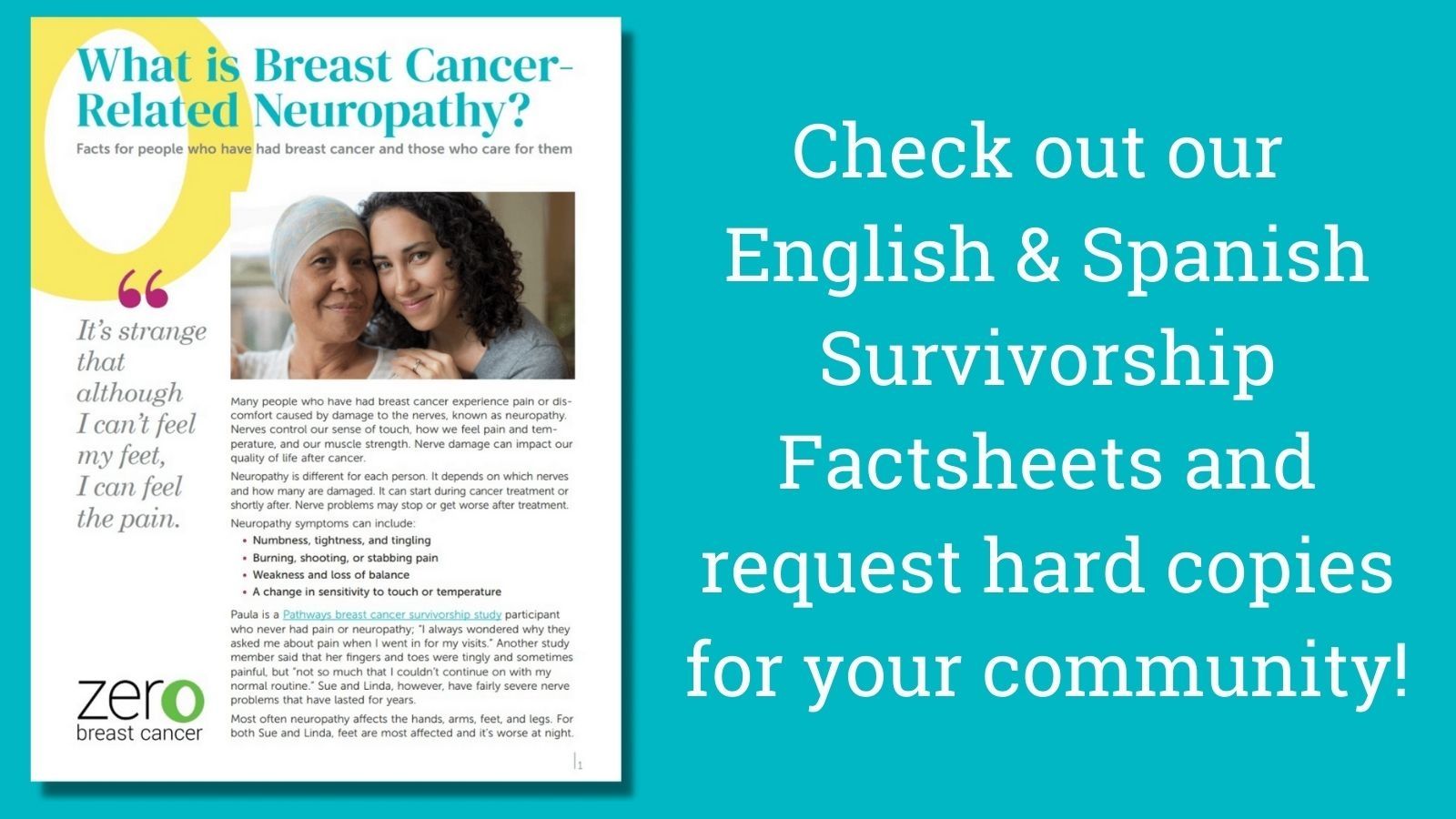What is Breast Cancer-Related Neuropathy? Part 2
This is a continuation of the blog What is Breast Cancer-related Neuropathy? Part 1, which describes the kinds of nerve pain and other symptoms and begins the stories of several members of the Pathways breast cancer survivorship study whose stories are told here. The first part also describes how cancer and it's treatment can cause neuropathy.
Who gets neuropathy?
An estimated 15-23% of breast cancer patients who receive taxanes experience neuropathy, and symptoms last more than a year in about two-thirds of patients. Our Pathways researchers are continuing to investigate who is most likely to have more severe and longer-lasting nerve problems.
So far we know that neuropathy that lasts for two years after treatment is more likely in older patients, those who had a mastectomy, are overweight or obese, had more lymph nodes containing cancer cells, or already had neuropathy or a related condition like diabetes. Our genes also play a part: Sue’s younger sister has neuropathy of unknown cause and her doctor said that put her at higher risk.
Treatment for Neuropathy
Nerve problems can be addressed in several ways and what works varies by person.
- A range of medications are used to treat neuropathy, from over the counter or prescription pills for inflammation and pain, antidepressants, and topical creams or patches to put on the affected area(s).
- Physical therapy programs or exercises programs designed for people with neuropathic pain and balance problems can help.
- Transcutaneous electrical nerve stimulation (TENS) is effective for some people.
- Complementary medicine techniques such as acupuncture and massage can stimulate and restore feeling in our nerves.
- Deep breathing and mindfulness practices can help some people with neuropathy and related sleep problems.
Sue’s care team tried different medications to find the combination that works for her. She had taken them for so long, she wondered if they were still effective. “I found out when I was in the hospital and did not take them for a week--they do make a difference!”
Linda found that painkillers didn’t help her. Maria says that both yoga and Feldenkrais exercises made her feel better.
Sue found that she could modify her old activities. For her, a step-through bike gave her a better sense of control than walking. She isn’t comfortable riding on streets and can’t go as far as she used to on a mountain bike, still she says, “It makes me feel alive! To get out and do this is wonderful.”In the beginning, Sue said she would put her feet “in a tub of iced cold water to help relieve some of the pain.” While massage brings relief to some, being touched was too painful for her. She tried acupuncture which helped, but she did not go back often enough “to see long-range improvement.”
And, of course, a healthy, balanced diet helps with neuropathy. Alcohol and tobacco smoking/vaping can make neuropathy worse, so it is best to avoid them.
We each must find what works for us. Some general resources are listed below. If you have nerve problems, talk to your health care provider about your symptoms, especially if they are severe or affect your daily life.
Coping with nerve problems
Keeping safe is critical for people with neuropathy. Lack of feeling increases the risk for burns in bathing, cleaning and cooking. It can help to wear shoes or slippers, to protect our feet. Researchers have found that people with neuropathy have a greater risk for bad falls. Check for more tips on managing neuropathy here.
For Linda, it is hard to predict when the pain or numbness will hit her. “I have to be careful how far I walk or how long I stand.” Linda reported that, while it doesn’t take the pain away, “I meditate every day for stress and relaxation and keep my mind focused on good things.” Spiritual readings and sitting or walking in nature help Maria with her pain.
In the beginning, Sue had trouble with many daily tasks, and walking, even with a cane, was difficult. Now she is doing better and rarely uses a cane. “I’ve learned to cope with the help of the medications; it’s been 7 years. It is still more painful at night. I do things that need to be done in the morning and take it easy in the later afternoon.”
Having help can also be critical. Sue’s sister and a friend who is a nurse have been great resources for her. “It takes a lot of people to get your life back on track as best that you can.”
NOTE: Many classes that can help with nerve symptoms are now available online, including deep breathing, mindfulness, meditation, Feldenkrais, self-massage, Qi gong, Tai chi, and yoga. Check with your health care provider about your condition to be sure you can safely do a new activity.



